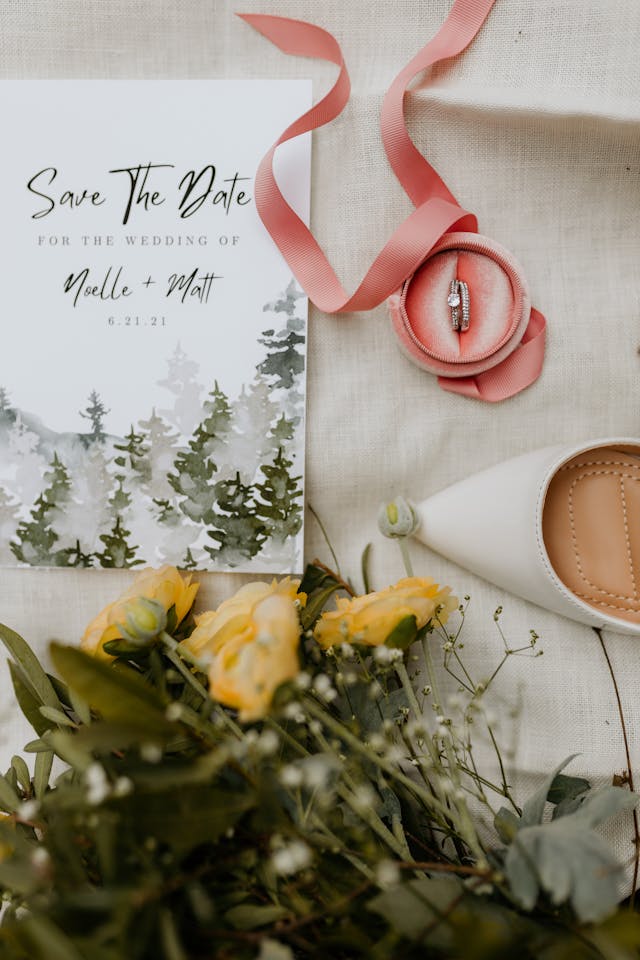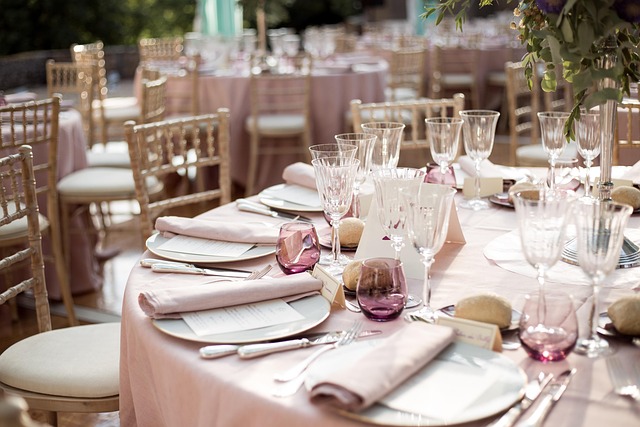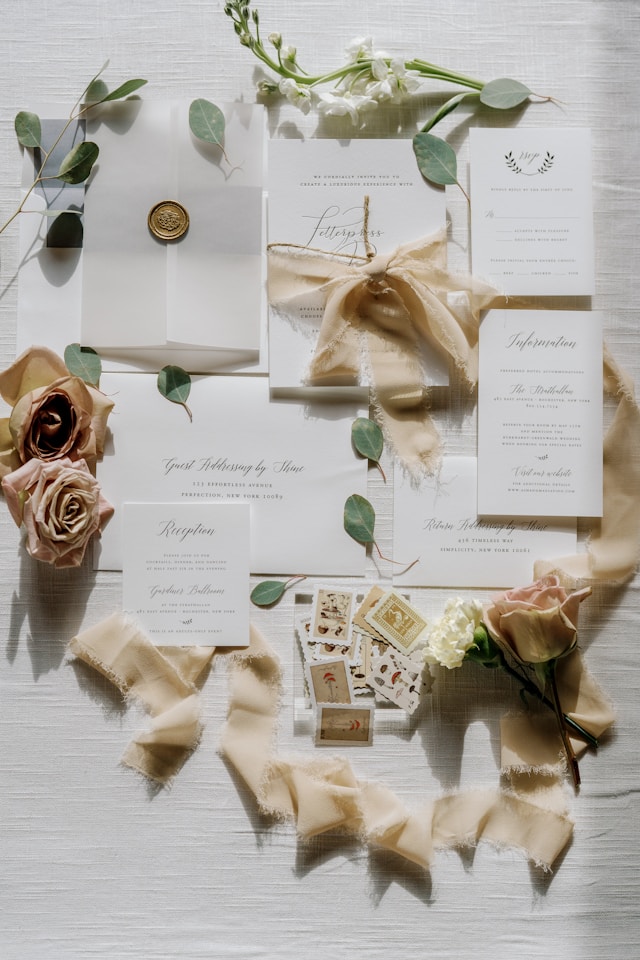Mapping Out Your Dream Wedding: A Step-by-Step Guide
Embarking on your wedding planning journey is both exhilarating and a bit daunting. From defining your vision to choosing the perfect venue, each step brings you closer to your dream day. In this guide, we’ll explore everything you need to create a celebration that reflects your love story, offering tips and inspiration along the way.
The First Step: Envisioning Your Dream Day

This is where your journey through wedding planning truly begins. Picture this: a blank canvas waiting for your unique touch. Whether you imagine a grand celebration or an intimate gathering, this stage is all about dreaming big. How do you want your special day to feel? What memories do you want to create? These questions are your guideposts as you start this exciting adventure.
Setting the Foundation: Initial Steps in Wedding Planning
Before diving into the details, it’s crucial to define what you and your partner truly want. Are you dreaming of a grand celebration or an intimate gathering? Take a moment to dream about what your wedding. What does it look like? Consider the atmosphere you want to create and the emotions you hope to evoke in your guests. This vision will guide every decision you make moving forward.
Planning a wedding is like crafting a beautiful tapestry, weaving together elements of joy, organization, and personal touches to create unforgettable memories. Take some time to write down some notes or create a vision board of how you want your wedding to look. Decide what goals you would like to achieve for your wedding. Keep these goals in mind as you move through the wedding planning process.
Let’s dive into how you can plan an extraordinary wedding that will be remembered fondly for years to come.
Step Two: Hire a Wedding Planner, Wedding Coordinator, or Day-Of Coordinator
Wedding Planner
Decide if you would like to hire an event planner, event coordinator, or day-of coordinator to assist in planning your wedding. What is the difference, you ask? Well I’ll tell you:
A wedding planner is someone who makes a living planning weddings. They manage various tasks throughout the entire wedding planning process. They work closely with clients to understand their wedding objectives and their desired outcomes while doing their best to provide as smooth an execution as possible.
For example, a wedding planner would be responsible for the following tasks:
- Meet with the couple to understand their needs for the event
- Sticking to a budget
- Helping with venue selection
- Creating and negotiating contracts
- Assisting with the design of the wedding
- Creating an event schedule
- Communication with vendors
- Schedule wedding meetings
- Create floor plans
- Handle wedding logistics
- Handles wedding invitation details
- And much more!
Wedding Coordinator

A wedding coordinator works to implement the event plan and manages logistics on the ground. They usually work closely with the event planner or couple and are involved in the event’s execution.
For example, a wedding coordinator would be responsible for the following tasks:
- Coordinating vendors and venue relationships
- Implementing plans related to specific aspects (such as guest management or decor)
- Overseeing the budget
- Your liaison between event planner and clients, vendors, and venue
- Managing timelines
- Ensuring venue setup
- Handle any issues that arise
Day-Of Coordinator
The day-of coordinator oversees the event on the day itself, ensuring everything runs smoothly and according to plan. They are primarily involved on the day of the event, though they may have some pre-event communication with the client and vendors.
For example, a day-of coordinator would be responsible for the following tasks:
- Managing vendors
- Coordinating staff
- Handling any last-minute issues
- Ensuring your wedding runs on schedule
They can be a lifesaver and keep the stress of the big day off you, ensuring to do their best to create as memorable and smooth an event as they can. Of course, things may come up and things can happen that are out of their or your control, but with them, you can make a plan for any intangibles you can think of to deal with and they’ll do their best to have a plan in place for those things and any others you may not have thought of.
The choice is really up to you whether to hire one of these positions or not. I didn’t when my husband and I got married, but I also had amazing sisters who helped me through the whole process and unbeknownst to me handled any issues the day of.
Step Three: Setting and Allocating the Budget
One of the most important parts of planning a wedding is creating a solid budget. This budget will allow you to plan your event categories around specific amounts, moving things around when adjustments are needed and the funds are available. Begin with an overall total budget for your wedding and then break that total down into specific categories.
Some categories you’ll want to include in your wedding budget are:
- The Venue: If you are planning the wedding at a specific venue other than your home, you’ll need to keep in mind the cost of the venue, any necessary insurance, deposit, and so on. Search for the best value for your money and decide which is best for you and your event.
- Food and Beverages: Keep in mind if you’ll be serving a large meal, hors d’oeuvres, alcohol, or just juice, soda, coffee, and water. These prices can be quite substantial depending on the type of food or beverage and the guest list numbers.
- Entertainment: Whether it’s a live band, a solo violinist, DJ, or just your music player, be sure to keep in mind the cost for the type of entertainment and any other compensation that may need to be included. Keep in mind any equipment you may need for this as well.
- Decorations: Decide on the type and creation of the decorations you would like for your wedding. Will you be DIY-ing all your decorations or will you hire someone to create them for you? Keep your theme/color scheme in mind and be sure to plan pricing accordingly.
- Staff: Depending on the event, staff may be included or you’ll need to hire them. Keep in mind any tips, accommodations if needed, transportation costs if necessary, etc. These people are working for you during your big day and although that may be their occupation, it’s always nice to show appreciation especially if they’ve had to deal with something out of the ordinary.
- Marketing and Other “Paper” Items: Will you be promoting the event? Where and how will you be doing that? Creating a Facebook Event, flyers, or even sending invitations could be part of your marketing as they are created to “persuade” your guests to attend. This could also include signage you want to use for the reception, tables, etc.
- Technology/Equipment: Will you need anything to make your wedding special? A projector to show a video? A fog machine to set the atmosphere? If there is anything extra in terms of tech and equipment, be sure to allocate funds to the rental/purchase of the items.
- Miscellaneous/extras: Even the best-planned events have additional costs pop up. Creating a category for the unforeseen will not only give you peace of mind but will allow you to take care of them with ease. You could also use this category or create another one for gifts to others for their service: Your event planner, any staff or helpers, bridesmaids/groomsmen, and so on.
Budgets don’t always have to be fixed in their amounts. If some category items are undecided, the venue for example, places a maximum expense amount in that category to allow you to make a clear decision with the funds available. That also allows you to move money if the venue you chose doesn’t cost quite as much as you allocated for the category.
If you feel you can’t complete the budget without having all your peeps in place with their positions clear, it can be a work in progress until then to make informed decisions about prices and funds.
Step Four: Choose Your Event Software/Planner

If you choose not to go with a wedding planner and do things yourself, there are management and planner tools out there to help you keep things organized and flowing as you progress your wedding’s preparation timeline.
Do a quick search and I’m sure you’ll find something that will suit your wedding. Think of a website (if needed), tracking sheets, etc. A good physical or digital planner can be a good place to start. A few sites that offer checklists, websites, and more you can check out are:
Step Five: Your Wedding Theme and Color Scheme
This is where you can let your creativity shine. Whether you’re drawn to a rustic charm or a modern elegance, making it your own is key. Some ideas are as follows:
- Seasonal color schemes
- Favorite colors with shade differences
- Favorite book series or
- Favorite movie, series, TV show
- Rustic
- Beach
- Holiday
- Nature/Garden
No matter your personality, you can choose any theme or color scheme you desire to make it stand out or extra special for your attendees. Create an atmosphere your attendees and you will enjoy throughout the event using decorations, table setting, and even your paper materials to accent the theme.
Step – Six A: Gather Your Team

A wedding takes an organized team to handle all the details. If you decide to forgo a planner, you may plan it with just a couple of people, or you can have a whole team to make sure the event goes smoothly. You’ll need a team behind you to help make your day as special as you dream. (But be courteous and understanding. Remember, they don’t HAVE to do anything for you, they are because they love and care for you.)
Dedicated members can have specific roles within the wedding process which creates a system of accountability as well as support for the area/tasks they are in charge of.
Some wedding planning roles could include:
- Help/coordinate decorations
- Overseeing food set up/replenishment
- Seating coordinator
- Bouncer/Rowdy person manager
- Main person’s #2 (Ie, maid of honor or a second in command)
- Music man
- Set up and take down
- Chauffeur
- Bartender, etc.
This allows you to delegate tasks so you’re not so stressed out about every aspect of the event. Have regular meetings before the event and after to know where everything is at, confirm roles/ what is expected, and discuss how the event went.
Step Six – B: Volunteers
Within every event, there will be those you recruit to volunteer for the small things. Determine how many volunteers you’ll need and what their jobs will be. Be sure to ask if they are willing to be a volunteer and be clear on what their duty is during the wedding.
Some volunteer positions and duties:
- Set up and tear down the event
- Tech wizards (running any tech-related devices for the event)
- Ushers and coat check
- Parking/valets
- Food attendants (if needed)
- Etc.
As the one in charge, it is up to you to decide and recruit your team. Make sure they are people you know will get the job done and have the skills needed to accomplish the tasks. Don’t just choose someone to choose someone. If they need some help with knowing what and how to do something, make sure you are there to teach or give them the resources they need to be successful at the tasks.
Step Seven: Set the Date

Decide on the day and time you plan to have your wedding. Here are some things to consider when deciding on a final date:
- Give yourself enough time! Ideally, you should have at least six months, if not a year or longer. Short notice is doable, but the sooner the better.
- Be aware of holidays and how that would affect your event and guests.
Once you’ve set the date (and time) you can start booking any external staff/vendors/venue you need. (Ie. Caterers, DJs, etc)
Step Eight: Create a Wedding Master Plan
Once you have a budget and time associated with your event, now is the time to get down to the specifics of your event.
This creation of a master plan will allow you to track all the things, keep them organized and on track as well as make it easier to coordinate with all who are involved.
Your event master plan should include all aspects of the event, including:
- Venue
- Logistics
- Catering/Food management (Including alcohol if provided)
- Special guests/presentations
- Agenda/Schedule
- Activities and Entertainment
- Marketing, Publicity, Promotions (Paper, Social media, flyers, etc)
- Volunteer management and responsibilities
- Team Members and their duties
- Decoration and room layouts
- Guest lists
- Gift Registries (If necessary)
- Seating charts
- Day of Processes
- Post-event items
Creating a detailed timeline to go along with your wedding is recommended as it gives you deadlines for specific items and assists in preparations progressing smoothly. Include a detailed timeline of the day-of events to show how things should go and to stay on track throughout the progression of the wedding.
One more piece of advice… WRITE IT DOWN! Don’t be one of those people who say, ‘Oh, I’ll remember, don’t worry.” You’ll definitely forget so get that written down and on the calendar so there is no possible way of missing any deadline, forgetting, or anything else. You can even take it a step further and keep notes as you go along for each aspect. When you spoke to vendors, where you are in the process of hiring them, what still needs to be done, etc. It hurts nothing to be detailed and have everything down on paper (or tablet if going digital).
Step Nine: Book Your Vendors

Step Nine – A: Book the Venue
Once you have a date and time for your wedding, now you can begin booking vendors, and one of the biggest ones is the venue (unless you plan to use your home – then jot down some things you need to get done to get it ready for the event). You may be choosing a venue for a specific location or perhaps it has meaning to you. No matter the reason there are some things to keep in mind when choosing your venue:
- Size: Think of your guest list and the amount you plan to invite. A small event of 50 people and a large event of 500 will have different needs to accommodate. Will you need extra rooms for the bridal party (in case of a wedding) or a kitchen if you plan to cook or refrigerate things?
- Cost: How much is it to book the venue? What is their deposit amount? How much will you get back if you need to cancel? Will there be any additional costs to booking the venue?
- Accessibility: Does the venue have accessible entrances and elevators if your event is on another floor? Are there washrooms nearby or connected to the room? Etc.
- Parking: Is there ample parking for your guests and caterers to park and have access to the room/building?
- Insurance: Will you need to purchase separate insurance for the space?
- Technology: If your event needs speakers, microphones, or TVs, make sure they are easy to set up in the space available. (Plugs, extension cords, Wi-Fi connection, etc).
Step Nine – B: Book the Caterer
The next category you’ll want to think about is your meal plan. Whether you’re having food catered in or items delivered from a local store (as is common nowadays), You’ll want to confirm the menu options, keeping in mind any dietary needs. This includes any drinks/alcohol you plan to have available. Some things to keep in mind for your food/beverage options:
- Guest size: Again, think of your guest list and the amount you plan to invite. A small gathering will equal less food/beverages than a larger event.
- Cost: How much will the catering cost? Will there be any extras that you’ll need to provide? This includes dishes, cups, etc that you will be providing if you plan to use paper and plastic products.
- Accessibility and Space: Will you have a path accessible for the caterer(s) and space for all the things you’ll need and the food/beverages you’ll provide?
Step Nine – C: Plan and Book Your Entertainment
Entertainment can encompass a lot of things, from the music you play to games and activities you want to provide. Think about your attendees and what would make your event exceptional. Here are some things to ponder when planning entertainment for your event:
- Music: Will you hire a band or DJ? Or will you play music from your phone/music player through speakers?
- Games/Activities: What other types of entertainment will you provide? Will you provide yard games or a treasure hunt? Will you put up a projector for an outdoor movie night with concessions? A bonfire with s’mores? Or will it be more of a mingling atmosphere? Will you have children and will you provide games for them? The decision is yours.
- Cost: How much will the Entertainment cost? Will there be any extras that you’ll need to provide? Will you allow guests to request songs?
- Space: Will you have enough space to set up your entertainment items? Think about the size and space you’ll need for each activity.
Step Nine – D: Decorations and Flowers
The question here is: Will your event need decorations of any kind? If it’s a small intimate wedding outside, you may have little to decorate. Keep your theme and color scheme in mind.
- Minimal or a bit more Extravagant: Decide how much decorating you want to do for your wedding. Will you have a few minimal things to compliment the theme or will you go all out with the decor?
- Cost: Keep in mind the cost of the decorations and flowers if you are using flowers. You want to make sure you budget enough to accomplish your wedding goals.
- Set Up Plan: To keep things organized, decide what decorations you want where. This will help keep you on budget and not overspend on unneeded items. Think centerpieces, banner locations, balloon arches, etc. This will allow you to tally what specific decorations you need to make your event atmosphere shine.
- Themes: Consider the overall theme of your wedding. Whether it’s rustic, vintage, modern, or seasonal, your decorations should align with the chosen theme.
- Guest Considerations: Take into account your guests’ comfort and experience. Decorations should not obstruct views or movement.
- Lighting: Determine what type of lighting will enhance the atmosphere. String lights, candles, or uplighting can create different moods.
- Color Scheme: Establish a cohesive color scheme that matches your theme. This will help streamline your decoration choices.
- Personal Touches: Think about incorporating personal items or heirlooms into your decor. This can add meaning and a unique flair to your wedding.
- Seasonal Elements: Utilize seasonal flowers, fruits, or other items to enhance your decorations and keep costs manageable.
- Cleanup Plan: Have a plan for cleaning up decorations after the event. Will you hire help or have friends assist?
Step Ten: Prepare all Paper/Digital Items

This is anything you will be using to let people know of and communicate about your wedding. That includes a website, invitations, Facebook event posts, or other social media posts to advertise. This could also include any signs, labels, programs, etc that you may want during your event.
Anything to get the idea of your event out there to those you would like to invite and attend your wedding.
Step Eleven: Confirm Any Special Guests
You may wish to have a special guest at your wedding that some invitees may not know about or you can announce it on your invitations. Perhaps an entertainer or soloist that you plan to hire for the special day or those that will make a speech. Confirm with your special guests their arrival time, and if they will be making a speech, when it will take place so that everyone is prepared.
Step Twelve: Safety, Comfort, and the Unexpected
This is often an item that some forget to think about. It’s just good practice to have a first aid kit handy for any incidences that may happen. Children are notorious for getting hurt. I’m not saying they will, but it’s good to have a first-aid kit handy.
If you have guests that may need extra comfort, perhaps a cushioned chair or space for an oxygen tank, be sure you can accommodate them as well as provide ample room to maneuver so that other guests don’t interfere with their equipment.
Another thing that may be difficult to plan for is the unforeseeable surprises. This could be anything from rowdy guests to unexpected changes in the weather. If you know your guests well enough, you may be able to think of some things that may occur that you can plan for to resolve/de-escalate the situations before they become larger problems. If your wedding is outside, plan an indoor space in case the weather changes unexpectedly. An issue could also be as small as a decoration falling to the floor that you had on a wall or as large as a medical emergency.
Not only do you want a successful wedding, but you also want your guests to have a good time, and planning for the unseen, although difficult, will prepare you to handle any situation that arises efficiently and with ease.
Step Thirteen: Day of Processes

Your wedding is almost here and one of the last things you may want to do is create an agenda for the day of the event. Your agenda should walk through the entire day from arrival/setup to cleanup/exit of the building.
Include all details, whatever you feel is going to make this event run smoothly. More is better, I say. If you end up not needing some of the details, at least they were there in case you did.
You could list the events in order or use a timeline with time slots for each item happening at a certain time. You choose how you want to list and keep track of your items to suit you.
It is also good to list with the tasks who is in charge of that task so you can be sure everything is accounted for during the event. It also gives accountability, a list of things to go over with any helping members to be sure they are on the same page, etc.
Step Fourteen: Things to Keep in Mind in the Days Leading Up to Your Wedding
In the days leading up to your wedding, there are some things you’ll want to check off.
Here is a list of some things to think about leading up to your event.
- Send reminders to attendees and check for RSVPs if needed.
- Check the setup of your venue/home and do a walkthrough (or set up if you are doing the setup yourself and can get into the venue early to do so or even the day before).
- Check the weather forecast and prepare accordingly. Make a plan for unforeseeable changes. The weather can be unpredictable at times.
- Meet with your volunteers/team/planner/coordinator to make sure everyone is clear on their duties and is on the same page.
- Check with vendors and confirm deliveries.
- Confirm any special guests.
- Charge and check all technological equipment you’re bringing and using.
- Prepare emergency kits and first aid (Supplies, outfit, bridal, etc).
- Take a break (be sure to get some time to relax and decompress from all the planning, so you’re ready to tackle anything that comes the day of the event (or before/after) THIS IS A MUST!
Planning a wedding can be stressful, but also fun. Find time to relax and enjoy yourself as your attendees will be enjoying themselves. If you hire a planner/coordinator this will be easy. If not, perhaps allow one or two others to take shifts during the wedding so that everyone can have a good time and no one feels they are ‘on call’ or dealing with everything for the entirety of your wedding.
Reflecting on the Journey
Planning a wedding is a journey of love and collaboration. You’ve navigated through challenges and created something beautiful. Celebrate your achievements and cherish the love you share. Here’s to a future filled with happiness and cherished memories.
One Last Thing
As you reflect on your wedding planning journey, remember to celebrate the love and dedication that brought your vision to life. You’ve crafted a day that truly represents you and your partner. Embrace the memories you’ve created and the community you’ve joined, and look forward to a future filled with joy and togetherness.




